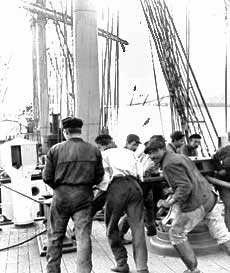Billy Budd or Hanus Human Rights Violation, you decide
Nick Dobbe
Melville Draft
Melville goes to great length in order to describe what he must have seen as severe injustices and wrongdoings in the lives of 17th century sailors. In times of war these practices were given virtual free range, and as such the novel takes place while Great Brittan and France are at war. Men were ‘pressed’ from every day life, stolen from prisons, pubs, ship yards, and even out at sea from ships under way. The practices that we can so clearly see as wrong and in violation of basic human rights were common place during this period. The way that Billy Budd is tried at sea exemplifies this sort of treatment; with the main witness acting also as the judge, poor Billy, was a victim of tradition.
With the opening chapter, Melville, gives us an intro into what has just been described. The Rights-of Man was boarded by one of Her Majesty’s ships, the Bellipotent and our Billy gets the opportunity to join the navy. In that instant not only was Billy taken from the Rights of Man, but the rights of man were taken from Billy. The author leaves little doubt ir minds what sort of story he is setting up.
Throughout the novel there is reference to ill treatment of the common sailor by the officers on board. The day after Billy’s impressment, “…a novice afterguardsmen absent from his assigned post when the ship was being put about; a dereliction resulting in a rather serious hitch to that maneuver, one demanding instantaneous promptitude in letting go and making fast. When Billy saw the culprit’s naked back under the scourge, gridironed with red welts and worse…Billy was horrified…”(Melville p.38)
All of this treatment is completely backed up by other accounts of the time; Melville doesn’t need to make up horrible treatment to show a grittier world of the 16th and 17th century sailor, they lived in a floating prison labor camp steeped in down home tradition. When I say tradition I don’t mean that papa sits at the head of the table, “The captain possessed extensive formal control through the rigid definition of duty, and enacted that control in eerie isolation…The ship was a “total institution” in which the captain had formal powers over the labor process, the dispensing of food, the maintenance of health,… [such] controls invested the captain with near-dictatorial powers and made the ship one of the earliest totalitarian work environments.” (Rediker p.211) This sort of absolute power is what ended up costing our hero his life.
So when the surgeon shows up and lets us all know what we had been thinking, that Claggart is dead, Vere puts Billy under arrest. Vere reacts with a sort of outlandish spiritualism claiming Billy to be an angel sent to pass divine judgment on poor Claggart. So what he does next really is confusing, as Billy is sent to another stateroom to be guarded till he was to be tried. So Claggart is dead and at the hands of Billy Budd. The only witness to the crime is the captain, and with all of his autocratic power, seems to find it necessary to pull together a makeshift trial by jury instead of making the ruling himself (being the witness it must have been a struggle for him to judge what actually happened without a trial???????????). Furthermore he denies Billy the option to stay his trial until the ship made it back to the rest of the fleet, which would have allowed for the admiralty court to preside over the incident. So the captain assembles a crack squad of British Naval officers and gives them his testimony. Once the trial is over, the captain then goes to ‘help’ the jury to come up with a verdict, followed swiftly by a hangin’ in the mournin’. Billy had basically been proven guilty and asked to hang before he stood trial. We all know how tedious it is to be at sea for months on end, why not break things up with some capital punishment, you know, make the time go by a bit more quickly.

